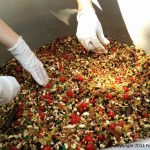Sri Sri Invokes Tagore In His Keynote For Clean Air Games Conference At Nobel Peace Center
In the conference titled “a sustainable future requires courageous investment”, Sri Sri emphasized that for any major social transformation, dynamism driven by inner peace was necessary which alone could create sustainable change in mindset.
Bengaluru, 4 June 2019: Close on the heels of the World Environment Day, global humanitarian and spiritual leader, Gurudev Sri Sri Ravi Shankar was invited to deliver the keynote address at Clean Air Games-a unique 2 day international event that brings together the cause of environmental impact and sustainability with sports, hosted at Nobel Peace Center, Oslo.
“The mindset of people is key in bringing any transformation to help us move forward,” Gurudev said in his address, “We need to change the mindset from a consumerist one to one that looks out for the future too. And for change of mindset, one must listen. Listening is impossible if someone is stressed. Outer peace can come only if there’s inner peace. Someone who is stressed in the mind will be too tired and exhausted to care about anyone or any cause. So, care for the planet comes from a peaceful individual, where one begins to see the planet as part of oneself. This education has to brought (to more people).”
 The others present at the conference included Liv Tørres, CEO of the Nobel Peace Center, and international sports commentator, Knut Skeie Solberg.
The others present at the conference included Liv Tørres, CEO of the Nobel Peace Center, and international sports commentator, Knut Skeie Solberg.
Addressing a mix of sportspeople, change makers, statesmen, policymakers, and other stakeholders, on the topic ‘Sustainability as a mindset: The Art of Living’s approach’,
Gurudev shared The Art of Living’s inside out approach of making social change, that is, people driven by inner spiritual peace and call to serve the society, have volunteered to make a significant impact. The Art of Living volunteers present in 156 countries have successfully planted 80 million trees and have worked on reviving 41 rivers (that existed merely on papers) across India, benefiting over 50 million people.
Gurudev cited the example of how The Art of Living volunteers reached out to more than 280000 farmers to discourage them from stubble burning which was one of the main causes of hazardous air quality and toxic pollutants being released in the air in and around Delhi region. The farmers were instead trained in mulching practices to recycle the waste, also benefiting the farmers as it provided sufficient nitrogen fix that the soil needed, while keeping the air clean and breathable.
He also shared the transformational story of Latur, one of the first towns to be hit by the fierce droughts in Maharashtra to an extent that it had to get portable water transported from other cities. (Groundwater)Tables turned, quite literally as the civil society, led by The Art of Living, joined the river rejuvenation movement to revive the dead rivers and streams, harvest rainwater, build groundwater recharge structures and raise the water table.
“Environment doesn’t have any geographic or political boundaries,” Gurudev said, “You cannot say we want clean air only in Norway. If there’s no clean air elsewhere we’re not going to have it here. We have one planet earth and we have one atmosphere. To care for that we need to create huge awareness throughout the world, for which spiritual tools need to be adopted.”
Apart from the need for spirituality to create more environmentally conscious individuals and change mindsets, Gurudev also shared practical inputs that can reduce the burden of environmental pollution on the planet. While referring to the global fireworks that go off during New Year’s Eve, creating massive air toxicity that makes the air unbreathable, Gurudev instead suggested, the world community to adopt a possible environmental middle path of electronic (laser) fireworks.
He also challenged the misnomer that organic farming was uneconomical and that chemicals and GMO seeds were needed in the soil for quicker output, without which the entire population will starve. “We’ve proved this is wrong. This is just a lobby trying to take money and power from poor people. So the poor farmers cannot maintain their seed banks. It pushes the poor farmer into dependence. We’ve demonstrated again and again in India that doing agriculture organically is sustainable.”
During his interaction with Liv Tørres about courageous leadership needed for sustainable investments, invoking the Nobel Laureate-Rabindranath Tagore, he shared, “You need the courage to face opposition from unknown corners when you are convinced that something needs to be done. Tagore gave a beautiful slogan-Ekla Chalo Re. You move alone even if there’s nobody with you. But then everyone will come together, when they see what you are doing, is much needed.”









